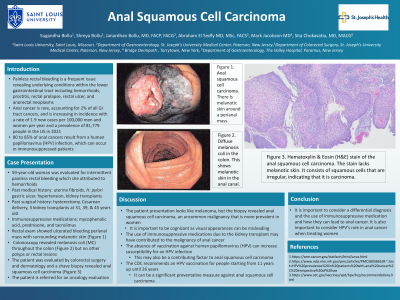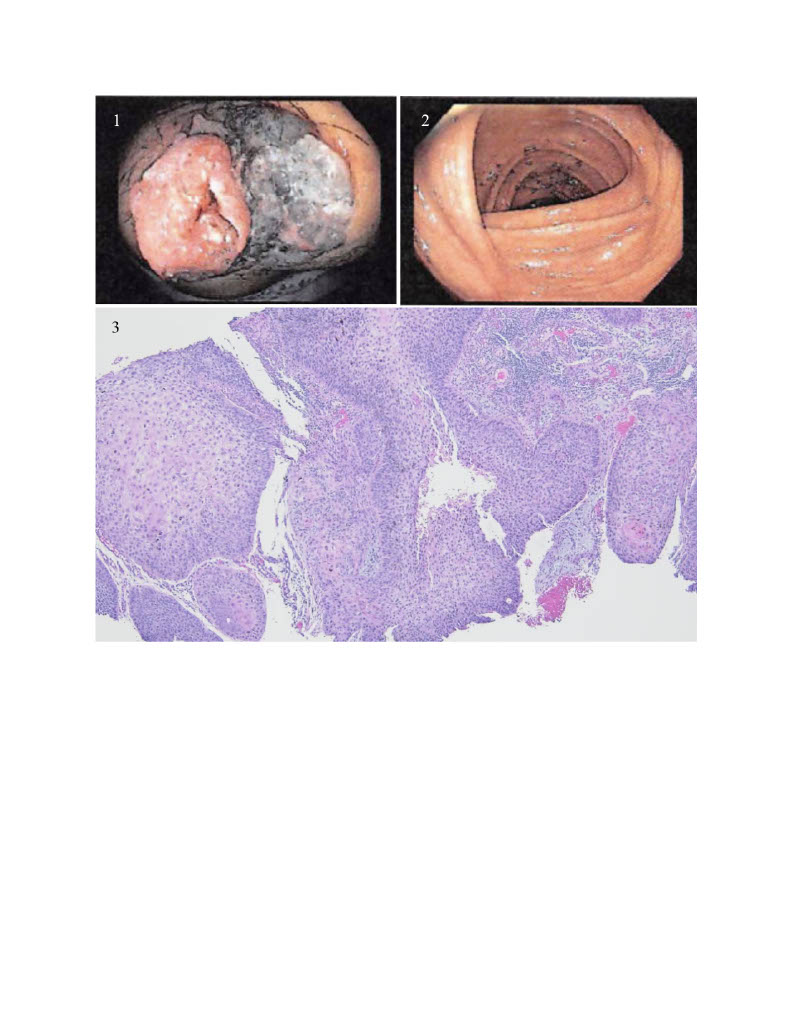Monday Poster Session
Category: Colon
P2083 - Anal Squamous Cell Carcinoma
Monday, October 28, 2024
10:30 AM - 4:00 PM ET
Location: Exhibit Hall E

Has Audio
- SB
Sugandha Bollu
St. Louis University
Colonia, NJ
Presenting Author(s)
Sugandha Bollu, 1, Shreya Bollu, 1, Janardhan Bollu, MD, FACG2, Abraham El-Sedfy, MD, MSc3, Mark Jacobson, MD4, Sita Chokhavatia, MD, MACG5
1St. Louis University, Colonia, NJ; 2St. Joseph's University Medical Center, Edison, NJ; 3St. Joseph's University Medical Center, Paterson, NJ; 4Bridge Dermpath, Tarrytown, NY; 5The Valley Hospital, Paramus, NJ
Introduction: Painless rectal bleeding is a frequent issue that reveals several underlying conditions within the lower gastrointestinal tract including hemorrhoids, proctitis, rectal prolapse, rectal ulcer, and anorectal neoplasms. Anal cancer is rare, accounting for 2% of all GI tract cancers, and is increasing in incidence with a rate of 1.9 new cases per 100,000 men and women per year and a prevalence of 81,779 people in the US in 2021. 80 to 85% of anal cancers result from a human papillomavirus (HPV) infection, which can occur in immunosuppressed patients.
Case Description/Methods: A 59-year-old woman was evaluated for intermittent painless rectal bleeding which she attributed to hemorrhoids. Past medical history includes uterine fibroids, H. pylori gastric ulcer, hypertension, and kidney transplants. Past surgical history includes a hysterectomy and a Cesarean delivery. She also had three kidney transplants initially at 31 years old which was rejected and subsequent transplants at 39 and 45. Immunosuppressive medications included mycophenolic acid, prednisone, and tacrolimus. A rectal exam showed an ulcerated bleeding perianal mass with surrounding melanotic skin (Figure 1). A colonoscopy revealed melanosis coli (MC) throughout the colon (Figure 2) but no other polyps or rectal lesions. The patient was evaluated by colorectal surgery and dermatology and a shave biopsy revealed anal squamous cell carcinoma (Figure 3). The patient is referred for an oncology evaluation.
Discussion: The patient presents with anal squamous cell carcinoma, an uncommon malignancy that is more prevalent in women. The use of immunosuppressive medications due to the kidney transplant may have contributed to the malignancy of anal cancer in this patient. The absence of vaccination against human papillomavirus (HPV) can increase susceptibility for an HPV infection, which may also be a contributing factor to anal squamous cell carcinoma. The CDC recommends an HPV vaccination for people starting from 11 years up until 26 years; this vaccine can be a significant preventative measure against anal squamous cell carcinoma.

Disclosures:
Sugandha Bollu, 1, Shreya Bollu, 1, Janardhan Bollu, MD, FACG2, Abraham El-Sedfy, MD, MSc3, Mark Jacobson, MD4, Sita Chokhavatia, MD, MACG5. P2083 - Anal Squamous Cell Carcinoma, ACG 2024 Annual Scientific Meeting Abstracts. Philadelphia, PA: American College of Gastroenterology.
1St. Louis University, Colonia, NJ; 2St. Joseph's University Medical Center, Edison, NJ; 3St. Joseph's University Medical Center, Paterson, NJ; 4Bridge Dermpath, Tarrytown, NY; 5The Valley Hospital, Paramus, NJ
Introduction: Painless rectal bleeding is a frequent issue that reveals several underlying conditions within the lower gastrointestinal tract including hemorrhoids, proctitis, rectal prolapse, rectal ulcer, and anorectal neoplasms. Anal cancer is rare, accounting for 2% of all GI tract cancers, and is increasing in incidence with a rate of 1.9 new cases per 100,000 men and women per year and a prevalence of 81,779 people in the US in 2021. 80 to 85% of anal cancers result from a human papillomavirus (HPV) infection, which can occur in immunosuppressed patients.
Case Description/Methods: A 59-year-old woman was evaluated for intermittent painless rectal bleeding which she attributed to hemorrhoids. Past medical history includes uterine fibroids, H. pylori gastric ulcer, hypertension, and kidney transplants. Past surgical history includes a hysterectomy and a Cesarean delivery. She also had three kidney transplants initially at 31 years old which was rejected and subsequent transplants at 39 and 45. Immunosuppressive medications included mycophenolic acid, prednisone, and tacrolimus. A rectal exam showed an ulcerated bleeding perianal mass with surrounding melanotic skin (Figure 1). A colonoscopy revealed melanosis coli (MC) throughout the colon (Figure 2) but no other polyps or rectal lesions. The patient was evaluated by colorectal surgery and dermatology and a shave biopsy revealed anal squamous cell carcinoma (Figure 3). The patient is referred for an oncology evaluation.
Discussion: The patient presents with anal squamous cell carcinoma, an uncommon malignancy that is more prevalent in women. The use of immunosuppressive medications due to the kidney transplant may have contributed to the malignancy of anal cancer in this patient. The absence of vaccination against human papillomavirus (HPV) can increase susceptibility for an HPV infection, which may also be a contributing factor to anal squamous cell carcinoma. The CDC recommends an HPV vaccination for people starting from 11 years up until 26 years; this vaccine can be a significant preventative measure against anal squamous cell carcinoma.

Figure: Figure 1: Anal squamous cell carcinoma
Figure 2: Diffuse melanosis coli in the colon
Figure 3: H&E stain of the anal squamous cell carcinoma
Figure 2: Diffuse melanosis coli in the colon
Figure 3: H&E stain of the anal squamous cell carcinoma
Disclosures:
Sugandha Bollu indicated no relevant financial relationships.
Shreya Bollu indicated no relevant financial relationships.
Janardhan Bollu indicated no relevant financial relationships.
Abraham El-Sedfy indicated no relevant financial relationships.
Mark Jacobson indicated no relevant financial relationships.
Sita Chokhavatia indicated no relevant financial relationships.
Sugandha Bollu, 1, Shreya Bollu, 1, Janardhan Bollu, MD, FACG2, Abraham El-Sedfy, MD, MSc3, Mark Jacobson, MD4, Sita Chokhavatia, MD, MACG5. P2083 - Anal Squamous Cell Carcinoma, ACG 2024 Annual Scientific Meeting Abstracts. Philadelphia, PA: American College of Gastroenterology.

